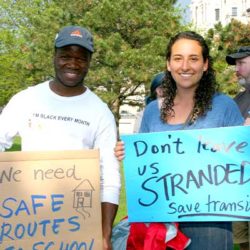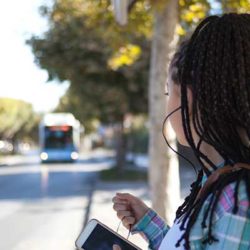Key Initiative
Rethinking I-94
Move Minnesota is advocating for walking, biking, and transit solutions that put community first when I-94 is reconstructed. We are raising up what we heard during a multi-year community engagement process as we firmly oppose expansion of the highway. Working collaboratively, we add our voices to the chorus of resilient families and neighborhoods who want to be healthy, thriving, and connected.
About this Initiative
MnDOT is in the midst of a planning process for reconstructing I-94 between downtown Saint Paul and downtown Minneapolis. This project presents one the largest opportunities to address the negative community impacts caused by the construction of the highway, and to reduce emissions.
An Unjust History
In the 1960s, the construction of I-94 destroyed homes, shuttered businesses, and displaced families. Communities of color were particularly harmed: 1 in 8 African Americans in Saint Paul’s historically Black Rondo neighborhood lost a home because of the highway’s construction. The emotional, social, and economic consequences of that racial injustice have persisted for a generation. And, of course, the neighborhoods along I-94 weren’t the only ones ripped apart: the histories of a multitude of highway projects around the state and country tell the same story, with long-lasting effects still being felt today.
What’s At Stake
The planners and elected officials who backed I-94 all those years ago prioritized car travel above Black families and above all else, making the highway the go-to way of getting from one downtown to the other. Today, it is a barrier for many residents—one that produces huge amounts of air pollution, damaging our climate and creating serious health problems for the communities around it. In the next 20 years, things could get better—or worse. This reconstruction project could begin to right some big wrongs and put us on the path to a more climate-friendly future, or it could double down on the mistakes of the past.
Learning from Community
Throughout 2018, and building on years of neighborhood engagement work that began in 2012, Move Minnesota engaged members of Saint Paul’s Rondo and Frogtown communities to better understand the impact that I-94 has had on residents’ lives, and the changes they want for the future. What we learned is guiding our advocacy today:
- Many people expressed a desire for safe streets to cross, slower moving vehicles, and ways for children to bike to neighborhood destinations.
- Frontage roads were repeatedly mentioned as major barriers to accessing the pedestrian and bike bridges that cross I-94.
- Most importantly, beyond better infrastructure, we heard the community’s need for transparency, accountability, and a seat at the decision-making table.
Our Actions
Informed by a multi-year community engagement process in communities along I-94, Move Minnesota and partners are pushing MnDOT to prioritize fast, frequent, and connected public transit along the corridor from downtown Minneapolis to downtown Saint Paul, and ensure that people can walk, bike, and use transit within and across the I-94 corridor without worrying about speeding cars. Together, we are building a coalition based on our shared values and a vision that centers people, not traffic.
As a member of MnDOT’s Community Leaders Group, Move Minnesota is demanding that MnDOT ensure the following as part of the reconstruction process:
- Build NO new lanes, and instead convert an existing lane to dedicated transit.
- Make fast, frequent, and improved transit a priority.
- Create safe biking, walking, and rolling connections and crossings in the communities adjacent to the corridor and build more livable communities.
- Create a process of involvement that is transparent, inclusive and economically beneficial to communities of color impacted by this corridor in the past, present and future.
Why It Matters
The changes that are being planned for in the I-94 corridor will impact the lives of people in the surrounding neighborhoods for many decades. Cars on the street and entering and exiting highways currently make it dangerous to walk and bike. The air pollution from highway travel lowers life expectancy by years, and even decades, in the communities adjacent to those corridors. Further, both Minneapolis and Saint Paul determined that car travel needs to be reduced 35-40 percent to adequately reduce climate pollution. The racial justice and environmental justice implications could not be more clear.
In Minnesota, while people of color and lower income tend to own fewer vehicles, do less driving, and use public transit more often than other groups, they are exposed to higher levels of traffic-related pollution. This is because busy roadways, and their associated air pollution, often run through communities of color and lower income.
Minnesota Pollution Control Agency
Our Objective
We must ensure that people who live and work along I-94 have clean air, walkable neighborhoods, welcoming bike paths, and reliable transit.
Instead of investing in freeway expansion, we need decision-makers to invest in solutions that protect the health and wellbeing of these communities. We need MnDOT staff and local officials to listen to what the community needs, and take a visionary approach to the corridor that connects people and places, protects our climate and health, and prioritizes fast, frequent, and connected public transit.

Move Minnesota is collaborating along I-94 to advance sustainable, community-based solutions in a corridor rich with transit, biking, and walking needs and potential.
How Can You Take Action?
Ensure Community Perspectives Shape this Project
Do you live or work along I-94? Let us know how transit, bicycling, and walking improvements would improve your neighborhood, daily experience, or ways of getting around. Move Minnesota will bring community perspectives into our advocacy efforts and future storytelling. If you’re interested, we can also follow up when it comes time for public testimony or other local action.
Related News & Updates
-
Community Voice Impacts How Rethinking I-94 Moves Forward in 2022 as MnDOT Agrees to Redraft Project Goals & Priorities
After months of working to mobilize advocates, engage decision-makers, and raise awareness, we are excited to be closing out the year with new progress on this important issue.
-
The Injustice of Urban Highways—and the Path Forward
I-94 in the Twin Cities, Houston, New Orleans and many more – From one city to the next, the stories about our highways’ unjust and environmentally destructive past and present are stunningly interchangeable.
-
Saint Paul Prioritizes Community and Transit Along I-94, Rejects Highway Expansion
We’re making progress in the fight for walking, biking, and transit solutions that put communities and climate first when I-94 is reconstructed!
Explore Other Initiatives
We’re building coalitions, engaging communities, organizing with
advocates, and more.
-

Transportation Forward
Move Minnesota leads a coalition of statewide partner organizations calling on the legislature to increase funding for bus, rail, bicycling, and walking.
-

Boost the Bus Campaign
The Twin Cities needs faster, better bus rides for more people. We are advocating for simple solutions with the power to make a big impact.
-

Changing Choices Along the C Line
Move Minnesota is developing culturally-relevant education models with communities along Metro Transit’s C Line to support people walking, biking, and using transit.
